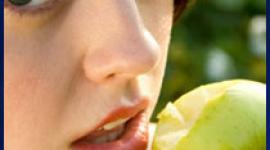Vegetarian or Anorexic?
Your daughter's seemingly healthy eating habits could be masking a deadly eating disorder
 At her cousin's wedding, Melissa, 14, looked around at the female guests and imagined what the kids at school would say: What a bunch of porkers. "Right there," says Melissa, who was teased for being slightly overweight in junior high school, "I decided I was going to be different."
At her cousin's wedding, Melissa, 14, looked around at the female guests and imagined what the kids at school would say: What a bunch of porkers. "Right there," says Melissa, who was teased for being slightly overweight in junior high school, "I decided I was going to be different."
As she entered high school, Melissa became a vegetarian to cut the calories and fat her family's meat and fried food diet was heavy on. People praised her slimmer appearance as well as her self-discipline in following such an apparently strict diet. Melissa continued to lose weight, believing that the slimmer she became, the more she would impress people. But by the following spring, it was obvious to everyone but Melissa that she had crossed a line and become anorexic.
This is not to say that every girl who decides to go veg is headed for an eating disorder. "For most teens, becoming vegetarian is a healthy choice," says Judy Krizmanic, author of Teen's Vegetarian Cookbook (Viking, 1999). But as with any significant change a child makes, the parents must be sure she's doing it correctly--and with the right motivation. "Wanting to be healthy, being concerned about the environment or animals are all good reasons," says Nancy Logue, Ph.D., director of the Renfrew Center, an eating disorder clinic in Philadelphia. "But when a lifestyle is pursued to extremes, or extreme behavior becomes attached to it, there's potential for a serious problem."
Anorexia, a pathological fear of weight gain that leads to excessive weight loss, often manifests itself with an obsessive-compulsive personality. Vegetarianism is not simply a lifestyle choice for an anorexic girl. What and how she eats become the daily yardstick by which she measures her worth. Common beliefs among anorexics include, "If I'm a good person, I can have five extra bites at dinner" and "I'm a strong person because I can eat less than other People. Everyone else is weak."
A report in the Archives of Pediatric Adolescent Medicine (August, 1997) analyzed how teens hide eating disorders behind the healthy facade of vegetarianism. The study found that while veg teens ate more fruits and vegetables than their omnivorous peers, they were also twice as likely to diet frequently, four times as likely to diet intensively and eight times as likely to abuse laxatives--all behaviors associated with eating disorders.
The National Association of Anorexia and Associated Disorders estimates that more than 8 million Americans suffer from full-blown eating disorders and that 86 percent of them develop the problem before age 20. While anorexia is relatively rare, occurring in just 3 percent of women, its eating disorder health problems and complications can be dire. "It has the highest mortality rate among eating disorders," says Monika Woolsey, M.S., R.D., editor of the After the Diet Newsletter (www.afterthediet.com) and author of American Dietetic Association book Eating Disorders: Putting It All Together.
One reason eating disorders begin in adolescence is because those years are a time of intense pressure--from friends, parents, teachers and society. A key developmental issue for teens is identity, and they begin to struggle with questions like Who am I? and Where do I fit in? According to Amy Tuttle, R.D., L.S.W., director of nutrition services at the Renfrew Center, "Young girls are looking outside of themselves for the first time for guidance on identity, and what do they see? That they are supposed to be thin. That women are supposed to have petite needs." To have a strong appetite--for food, competition or recognition--is still largely considered unfeminine in our culture. For girls, the external pressure to be thin and popular combines with an internal drive to excel and be perfect and makes them especially vulnerable to anorexia. (Not surprisingly, 90 percent of all anorexics are female.) According to the Renfrew Center, 53 percent of American 13-year-old girls are already unhappy with their bodies. And researchers have found negative body images among girls as young as 9.
Growing Needs
 Teenage girls usually don't shoot up six inches over a summer the way boys often do, but they still need nearly as much food to fuel their growing bodies. And they need the right mix of calories, notes Tuttle. In general, girls aged 11 to 18 need 2,200 calories a day--more if they're physically active. Of that, 40 to 50 percent should come from carbohydrates, 20 to 30 percent from protein and no more than 30 percent from the good fats found in olive oil, avocados and nuts. "Teenage girls should also get plenty of calcium, iron, zinc and vitamins D and [B.sub.12]," says Tuttle. Here's what the National Academy of Sciences recommends your daughter take in every day:
Teenage girls usually don't shoot up six inches over a summer the way boys often do, but they still need nearly as much food to fuel their growing bodies. And they need the right mix of calories, notes Tuttle. In general, girls aged 11 to 18 need 2,200 calories a day--more if they're physically active. Of that, 40 to 50 percent should come from carbohydrates, 20 to 30 percent from protein and no more than 30 percent from the good fats found in olive oil, avocados and nuts. "Teenage girls should also get plenty of calcium, iron, zinc and vitamins D and [B.sub.12]," says Tuttle. Here's what the National Academy of Sciences recommends your daughter take in every day:
Calcium 1,200 to 1,500 milligrams (mg.)
Nondairy sources include broccoli, legumes, seeds, leafy greens like kale, collards, mustard and bok choy, and calcium-fortified foods.
Iron 15 to 18 mg.
The best sources are from the dried bean family, which includes lentils, lima and kidney beans. To enhance absorption, include vitamin C-rich foods like cantaloupe, broccoli and tomatoes with your meals.
Vitamin D 800 international units (IU)
Getting 15 minutes of sun exposure without sunscreen, two to three times a week, will allow the body to make enough on its own.
Vitamin [B.sub.12] 3 micrograms (mcg.)
Sources include fortified breakfast cereals, soy milk, veggie burgers, eggs and dairy products. Although seaweed, algae, spirulina and fermented products (like tempeh) contain [B.sub.12], it is a form that is not easily assimilated into the body. Supplements are another good source.
Zinc 15 mg.
Found in whole grains and whole-grain breads. Grains lose zinc when processed to make refined (white) flour.
A Healthy Start
It's just as important to provide your daughter with a supportive environment as it is to educate her on good nutrition.
* Be a good role model. Becoming a vegetarian should be enjoyable. Emphasize that a balanced diet has room for treats and that there's no need to deprive oneself.
* Be aware of your own prejudices toward overweight or thin people that may fuel her insecurity. "One of the most effective things we can do is to stop judging people by what they eat and what they look like," says Woolsey.
* If other family members eat meat, create vegetarian nights for everyone. Let your daughter decide what the menu will be and let her help you cook it. This will connect her to healthful food and teach her to be responsible for her new lifestyle.
* Compliment her on her skills and attributes, not her size or weight.
* Don't compare her with others, whether it's about appearance or schoolwork.
Warning Signs
People often lose some weight when they go veg because they're still learning how to eat healthfully. If you notice some of the following symptoms, however, your daughter may have a problem.
* Continued weight loss after the first two or three months of being vegetarian.
* Distorted body image. She repeatedly comments that she's fat or still needs to lose weight, even if she's thin or of a healthy weight.
* Regularly skipping meals or denying she's hungry.
* Complaints about feeling bloated or nauseated when she eats normal portions.
* Elimination of other foods besides meat, especially those that contain fat, like peanut butter, tofu, soy meat substitutes, breads, pasta and other nutritious foods.
* Ritualistic behavior. "Anorexics typically eat their food in a specific way, whether it's eating in a circle around the plate or cutting everything into several tiny pieces to make the food last," says Woolsey. "Or they may refuse to eat if food isn't served exactly on time."
* Compulsive calorie- and fat-gram counting. "It's hard to tell the difference between someone who's trying to educate herself and someone who's become obsessive," says Woolsey. But sometimes it's Obvious. "One of my patients spent over an hour choosing a salad dressing because she had to read every single bottle in the store."
* Obsessive and/or compulsive behavior. Teem are known for being passionate about whatever interests them at the moment, but it's not normal to spend hours rearranging canned food, setting aside the number of beans she can have that night or brushing her teeth five times a day.
* Frequently weighing herself.
* Thinning hair. She may also grow a layer of downy body hair.
The Right Course
If you think your daughter may be anorexic, the last thing you want to do is broach the subject in an accusatory way. "Focus on the specific behavior that can't be debated and how it makes you, as the parent, feel," advises Woolsey. For example, you might say, "When you only eat a banana and an apple for dinner, I'm scared that you aren't getting the important nutrients you need."
Many teens find that vegetarianism is a safe and appropriate way to assert their own identity. Because an anorexic's identity is pathologically connected to her diet, you need to show her that you respect her. Otherwise, she will only hear blame and criticism and shut you out.
What else you can do:
* Learn everything you can about eating disorders (see "Resources"). Anorexics often go through phases of bulimia (bingeing and purging), so it's essential to know the warning signs for both.
* Pick a good time and place to discuss your concerns. Make sure it's just the two of you and that there are no distractions (such as a ringing telephone) or lingering tensions from a recent argument.
* Offer her the opportunity to talk with a nutritional therapist, one who understands the emotional aspects of eating. Tell her that you want to make sure she has all the right information, so you'd like to hire an expert to work with her. If teens first build trust with a nutritional therapist, they're usually more receptive when the therapist feels it's time to bring in a doctor and/or a psychiatrist.
* The longer anorexia lasts, the more difficult the recovery. Don't be embarrassed to take your daughter to a physician sooner rather than later. A doctor can determine whether she's developing an eating disorder by checking, among other things, her progress on the growth chart and whether her periods have become irregular.
For the most part, becoming a vegetarian is a great way for teens to explore new foods and gain new experiences. As for Melissa, she got the treatment she needed and today is still a vegetarian. However, she continues to struggle against social pressures to be thin and in control of at least one thing--her body. "It's tempting to become alarmed when you hear the facts," says Krizmanic. "But as long as you talk to your teens and provide them with the skills and the resources they need, becoming a vegetarian should be a positive experience."
next: Women, Food and Eating Disorders
~ eating disorders library
~ all articles on eating disorders
APA Reference
Gluck, S.
(2008, December 30). Vegetarian or Anorexic?, HealthyPlace. Retrieved
on 2026, March 4 from https://www.healthyplace.com/eating-disorders/articles/vegetarian-or-anorexic



